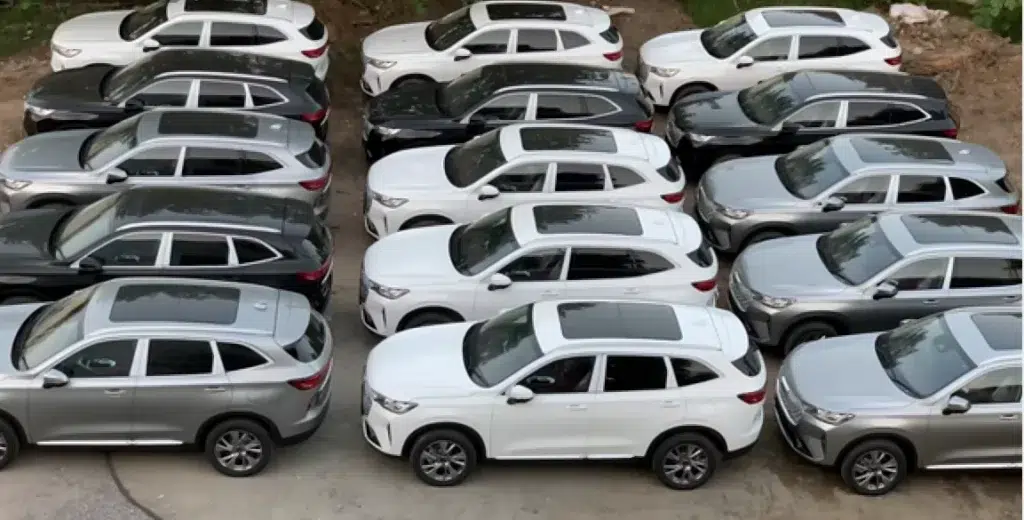- Web
- Feb 05, 2026
Car prices in Pakistan to rise from July due to NEV levy
-

- Web Desk
- Jul 02, 2025

ISLAMABAD: As of July 1, the start of the fiscal year (FY) 2025-2026 resulted in a significant increase in car prices across Pakistan, primarily driven by the introduction of a New Energy Vehicle (NEV) levy in the federal budget, and escalating international shipping expenses.
Car price increase among leading models
The automotive market experienced notable price hikes, particularly among popular brands. For instance, the price of the Kia Stonic Ex has risen from Rs4.767 million to Rs4.862 million.
Read more: Aurangzeb calls for equitable financial reforms, global solidarity at FFD4 in Spain
Similarly, the Kia Sportage L HEV saw its price increase from Rs10.9 million to Rs11.6 million. The Kia Sorento 3.5L V6 also saw a price adjustment, now costing approximately Rs14 million, up from Rs 13.5 million.
In contrast, electric vehicles (EVs) such as the EV5 Air, Ev5 Earth, and EV9 remained unaffected by the price changes, a push towards promoting electric mobility.
Understanding the NEV Levy
The NEV levy is a newly introduced tax aimed at gasoline-operated vehicles, primarily designed to promote the use of EVs in Pakistan.
Sources suggest that the administration is contemplating a five-year tax on all petrol and diesel vehicles to aid the shift towards electric transportation.
The effort is apparently part of a larger plan to foster the development of electric mobility within the country.
The NEV tax will be applicable to both, imported and domestically produced vehicles. The government expects that the significant tax will yield billions in revenue, reportedly earmarked to support the new five-year electric vehicle initiative in coming years.
The initiative is aimed at driving consumers away from fossil fuels and lessen dependence on oil, which eats up a major part of our imports each year.
Additional taxation measures impacting car prices
In addition to the NEV levy, several other taxation measures have been introduced that contribute to the increase in cars prices in Pakistan.
A climate support levy was established, imposing a 1 per cent tax on vehicles with engine capacities of up to 1,300 cc, a 2 per cent tax on vehicles ranging from 1,301 cc to 1,800 cc, and a three per cent tax on vehicles exceeding 1800 cc.
Additionally, the Goods and Services Tax (GST) for smaller cars was increased from 12.5 per cent to 18 per cent, further exacerbating the financial burden on consumers.
A carbon tax of Rs2.5 per litre was also imposed on petrol, expected to impact the overall cost of operating gasoline-operated vehicles.
The New Energy Vehicle Policy
According to IPRI, the New Energy Vehicle Policy for 2025-2030 is an initiative aimed at transforming Pakistan’s transportation sector from fossil fuels to electric vehicles.
It was launched by the Ministry of Industries and Production. The policy focuses on cutting greenhouse gas emissions, reducing reliance on imported fossil fuels, and promoting green technology.
Among its key goals, the policy aims for 30 per cent of new vehicle sales to be electric by 2030 and an ambitious 90 per cent by 2040.
It lays out a clear plan that includes financial incentives, inftastcuture improvements, and local manufacturing to boost the adoption of EVs.
Currency depreciation, other factors
The rising prices of vehicles in Pakistan isn’t just tied to imposition of taxes, but several other factors.
The sharp spike in cars prices is closely tied to the broader economic landscape – the ongoing depreciation of the local currency and rising international shipping expenses.
Financial woes of the consumers
The automobiles sector in Pakistan is at a crossroads, as the government pushes for a shift towards electric vehicles while simultaneously implementing levies and taxes that impact the pricing of traditional vehicles.
Read more: New taxes lead to hike in motorcycle prices
The brunt of all this will be felt by the consumer, however, already reeling with skyrocketing prices and an economic crisis that led to a huge inflation.




